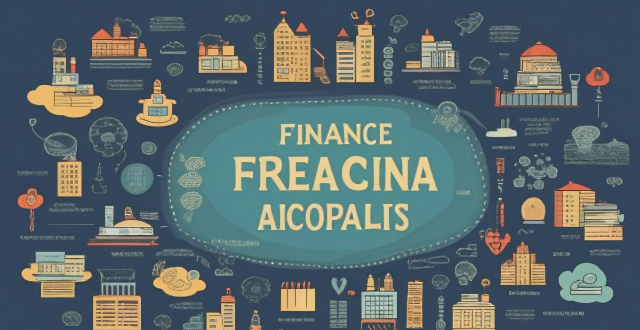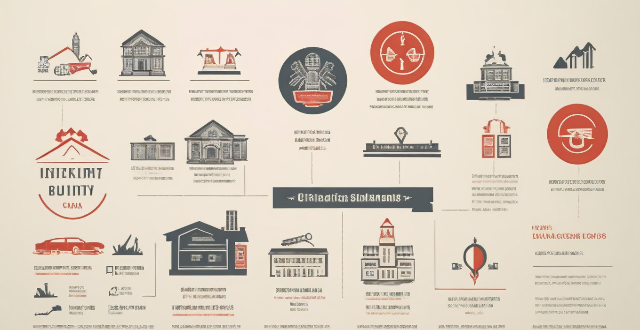Financial Personal

In what ways does financial literacy affect personal finance management ?
Financial literacy is crucial for managing personal finances effectively, as it helps individuals understand basic financial concepts, promotes prudent budgeting and spending habits, shapes savvy saving and investing strategies, and facilitates efficient debt management.

What are some common misconceptions about personal finance that financial education aims to correct ?
The text discusses common misconceptions about personal finance, such as the belief that saving is more important than investing and that credit cards are inherently bad. It also touches on the perceived tedium of budgeting, the underestimation of life insurance's importance, and the notion that retirement savings are unattainable for some. Moreover, it dispels the myth that all investments carry high risk and emphasizes the necessity of having a will. Overall, the article highlights how financial education can correct these misguided beliefs and help individuals manage their money wisely to achieve their financial objectives.

How has the COVID-19 pandemic highlighted the importance of financial literacy ?
The COVID-19 pandemic has underscored the importance of financial literacy. It helps people navigate job losses, market volatility, personal finance management, long-term planning, and healthcare needs. Financially literate individuals are better equipped to handle economic disruptions and make informed decisions about their money. Seeking support and resources is also crucial during challenging times. Overall, financial literacy is essential for personal resilience and economic stability in the face of global crises like the pandemic.

How can I maintain my financial freedom once I achieve it ?
The text discusses strategies for maintaining financial freedom, including creating a budget and sticking to it, building an emergency fund, investing wisely, living below one's means, and continuously learning and growing. It emphasizes the importance of discipline, planning, and effort in sustaining financial independence.

Can anyone achieve financial freedom ?
Financial freedom, a state where one's passive and active income covers living expenses without regular time-for-money exchanges, is a goal many strive for. Key factors for achieving it include education, saving habits, smart investing, debt management, multiple income streams, avoiding lifestyle inflation, long-term planning, and the right mindset. Actionable steps include budgeting, automated savings, early investing, continuous learning, and networking with like-minded individuals. While not everyone may achieve financial freedom due to varying circumstances, it is attainable for those who are committed and strategic in their approach.

What are the best practices for setting a personal budget ?
The article outlines best practices for setting a personal budget to achieve financial stability and success. It suggests determining income, listing expenses, setting financial goals, creating a budget plan, tracking spending, and adjusting the budget as needed.

What role does financial literacy play in achieving wealth growth ?
Financial literacy is essential for wealth growth, encompassing budgeting, saving, investing, retirement planning, and credit management. By understanding these aspects, individuals can make informed financial decisions, reduce debt, build wealth, and achieve long-term financial stability.

How can women avoid falling victim to financial scams and fraud ?
Financial scams and fraud can target anyone, including women. To avoid falling victim to these schemes, it's crucial for women to educate themselves about common scams like phishing, romance, and investment frauds. Safe online habits, such as securing devices and being cautious with personal information, are also essential. Regularly monitoring finances, using credit cards wisely, building a support network of professionals and trusted friends or family, and reporting suspected fraud immediately are further protective measures. Staying informed and vigilant significantly reduces the risk of financial loss due to scams and fraud.

How can governments encourage and improve financial literacy among citizens ?
Governments can encourage financial literacy by implementing education programs, offering accessible financial services, and enforcing consumer protection regulations. This will help citizens make informed decisions about their money, investments, and debts.

Is hiring a financial advisor worth it for someone looking to grow their wealth ?
Hiring a financial advisor can be beneficial for individuals seeking to grow their wealth, especially if they have complex financial situations or limited knowledge of personal finance. Financial advisors provide professional expertise, customized financial plans, time-saving convenience, objective advice, and ongoing support to help clients achieve their financial goals. However, the decision to hire a financial advisor should be based on individual needs and circumstances.

What are the steps to achieving financial freedom ?
Achieving financial freedom is a multi-step process that involves defining personal goals, creating a budget, paying off debt, building an emergency fund, investing wisely, increasing income streams, living below one's means, and continuously educating oneself about personal finance strategies. This journey requires patience, persistence, and a commitment to long-term growth rather than short-term gains. By following these steps, individuals can work towards achieving the lifestyle they desire without relying on traditional forms of income such as a job.

How can women balance their personal financial goals with family responsibilities ?
The article discusses strategies for women to balance their personal financial goals with family responsibilities, such as prioritizing goals, creating a budget, planning for emergencies, investing wisely, and seeking professional advice.

How can financial education help prevent debt ?
Financial education is crucial in preventing debt by empowering individuals with the knowledge and skills to make informed financial decisions. It covers understanding personal finance, smart borrowing practices, avoiding common pitfalls, and promoting healthy financial habits. By learning budgeting, saving, investing, credit score management, loan shopping, debt consolidation, and avoiding overspending, predatory lending, and credit card traps, individuals can reduce their risk of accumulating debt and enjoy greater financial stability and independence.

What are some effective personal finance management strategies ?
Managing personal finances effectively is crucial for achieving financial stability and long-term success. Here are some effective personal finance management strategies: 1. Create a budget that tracks income, expenses, savings, and adjustments. 2. Build an emergency fund with at least 3-6 months' worth of living expenses in a high-yield savings account or money market fund. 3. Pay off high-interest debt using the snowball or avalanche method. 4. Invest for long-term goals by starting early, diversifying, and staying consistent. 5. Protect your finances with health insurance, disability insurance, and life insurance. 6. Plan for retirement by starting early, maximizing contributions, and investing wisely. 7. Educate yourself through reading books, taking courses, and seeking professional advice.

How has the rise of digital banking affected the need for financial literacy ?
The rise of digital banking has significantly affected the need for financial literacy. As more and more people turn to online banking platforms, it becomes essential for them to have a basic understanding of financial concepts and practices. In this article, we will explore how digital banking has influenced the importance of financial literacy and what individuals can do to improve their financial knowledge.

How can I protect my personal information online ?
In today's digital age, protecting your personal information online is crucial. To safeguard sensitive data, one should use strong and unique passwords, keep software and systems up-to-date, be careful with public Wi-Fi networks, be wary of phishing attacks, and limit the amount of personal information shared online. These steps can significantly reduce the risk of having personal information compromised online.

What role does financial literacy play in reducing economic inequality ?
Financial literacy is a crucial factor in reducing economic inequality, as it enables individuals to make informed decisions about their money and increase wealth accumulation. Improving financial literacy can lead to reduced poverty rates by empowering low-income households to make smarter financial choices. Strategies for improving financial literacy include educational programs, access to financial services, and community outreach initiatives. By implementing these strategies, we can create a more equitable society where everyone has the opportunity to achieve financial stability and prosperity.

What are some common mistakes people make with their personal finances ?
The text discusses the common mistakes people make with their personal finances, including living beyond their means, not having an emergency fund, not investing for retirement, ignoring debt, and not saving enough for large expenses. It offers tips on how to avoid these mistakes, such as creating a budget, setting aside money for emergencies, starting early with retirement planning, prioritizing high-interest debt, and saving in advance for large expenses. The text emphasizes the importance of discipline, planning, and awareness in managing personal finances effectively.

What are some effective methods for teaching financial literacy to young adults ?
Financial literacy is a crucial life skill that every young adult should possess. It involves understanding how to manage money effectively, make informed financial decisions, and plan for the future. Here are some effective methods for teaching financial literacy to young adults: start with the basics, use interactive learning tools, encourage real-world practice, and provide access to financial professionals.

How does Fintech impact financial inclusion ?
Fintech has revolutionized financial services, making them more accessible and affordable. It has increased accessibility for unbanked populations, lowered costs, improved efficiency, driven innovation, enhanced security, promoted financial literacy, facilitated inclusion initiatives, enabled digital identity verification, supported microfinance and crowdfunding, and promoted mobile money and payment systems. These advancements have significantly impacted financial inclusion worldwide.

What are the long-term effects of lacking financial knowledge on an individual's life ?
The article discusses the long-term effects of lacking financial knowledge on an individual's life, which include difficulty in managing finances, increased debt and financial stress, limited opportunities for wealth accumulation, dependence on others for financial decisions, and missed opportunities for financial education. It emphasizes the importance of financial education in achieving financial goals and reducing stress.

What is the impact of financial regulation on innovation in the financial sector ?
Financial regulation plays a critical role in the innovation landscape of the financial sector, with both positive and negative impacts. Positively, it promotes transparency and trust, encourages responsible innovation, and facilitates access to capital. However, it can also slow down the pace of innovation, restrict experimentation, and stifle international competitiveness. To mitigate these negative effects, adaptive regulation, collaborative approaches, and education and training are recommended. Striking a balance between fostering innovation and ensuring safety is crucial.

What is the relationship between financial regulation and financial stability ?
The relationship between financial regulation and financial stability is crucial for the proper functioning of the economy. Financial regulation, consisting of laws and guidelines, aims to ensure the safety and soundness of the financial system and protect consumers. Financial stability, on the other hand, refers to a condition where the financial system can withstand shocks without significant disruptions. Financial regulation affects financial stability in several ways: 1. It prevents financial fraud and misconduct by enforcing strict rules and penalties, maintaining public trust in the financial sector. 2. It promotes transparency and disclosure, allowing stakeholders to make informed decisions and enabling regulators to monitor the financial system effectively. 3. Regulators encourage sound risk management practices, such as capital requirements and stress testing, contributing to overall financial stability. 4. They maintain market integrity by promoting fair competition and preventing monopolistic behavior, ensuring confidence in the financial system. 5. Regulators address systemic risks through macroprudential policies, safeguarding against widespread financial instability. In conclusion, financial regulation plays a vital role in maintaining financial stability by preventing fraud, promoting transparency, encouraging sound risk management, maintaining market integrity, and addressing systemic risks. However, finding the right balance between regulation and innovation is crucial for achieving both regulatory effectiveness and financial stability.

What is the impact of financial regulation on global financial markets ?
Financial regulation is vital for maintaining stability and efficiency in global financial markets. It influences market stability by reducing volatility and preventing crises, improves risk management through enhanced transparency and control over high-risk practices, protects investors from fraud and unfair trading practices, and fosters innovation while ensuring safety and compliance. This balance is crucial for the health and growth of the global economy.

What are the common mistakes people make when trying to achieve financial freedom ?
Achieving financial freedom is a goal for many, but it's not always easy. Along the way, people often make mistakes that can hinder their progress. Here are some of the most common errors: ## 1\. Not Having a Clear Plan One of the biggest mistakes people make is not having a clear plan for achieving financial freedom. Without a roadmap, it's easy to get sidetracked or lose motivation. * **Solution**: Create a detailed plan that outlines your goals, timeline, and strategies for achieving them. ## 2\. Spending Beyond Their Means Many people fall into the trap of spending more than they earn, which leads to debt and financial stress. * **Solution**: Live below your means by budgeting, tracking expenses, and cutting unnecessary costs. ## 3\. Not Investing in Their Future Failing to invest in long-term goals like retirement or building wealth can set people back years or even decades. * **Solution**: Start investing early and regularly, even if it's just a small amount each month. ## 4\. Ignoring Debt Repayment Carrying high-interest debt can be a major obstacle to achieving financial freedom. * **Solution**: Prioritize paying off high-interest debt as soon as possible. ## 5\. Lacking Diversification in Investments Putting all your eggs in one basket can be risky. Many people make the mistake of not diversifying their investments. * **Solution**: Spread your investments across different asset classes to reduce risk. ## 6\. Not Educating Themselves About Finance A lack of financial knowledge can lead to poor decision-making and missed opportunities. * **Solution**: Educate yourself about personal finance through books, courses, and other resources. ## 7\. Failing to Review and Adjust Financial Plans Life changes, and so should your financial plans. Many people forget to review and adjust their strategies over time. * **Solution**: Regularly review your financial situation and adjust your plans accordingly.

How can I control who has access to my personal data ?
How can I control who has access to my personal data? To control who has access to your personal data, it's important to: 1. Understand what personal data you have and where it is stored. 2. Review privacy policies and settings of websites and apps you use regularly. 3. Use strong passwords and two-factor authentication to protect your accounts. 4. Limit the amount of personal data you share online. 5. Regularly review and update your privacy settings. By taking these steps, you can help protect your personal data from unauthorized access and ensure that it remains private.

How do financial regulations impact banks and other financial institutions ?
Financial regulations are crucial for maintaining stability in the banking and financial sector. They protect depositors' interests, promote fair competition, prevent financial crises, and impact innovation and efficiency. Regulations like capital adequacy ratios, liquidity coverage ratios, and stress testing ensure depositors' safety. Antitrust laws and consumer protection laws encourage fair competition among banks. Prudential supervision and Basel III help prevent financial crises. However, excessive regulation may negatively affect innovation and profitability. Striking a balance between safety and promoting innovation is key.

Why is it important for women to have a solid understanding of financial planning and wealth management ?
The importance of financial planning and wealth management for women is underscored by the need for financial independence, empowerment, and long-term stability. Women face unique challenges such as longer life expectancies and potential career interruptions, making it crucial for them to be financially savvy. Understanding key areas like budgeting, investing, insurance, and retirement planning can help mitigate risks and ensure economic security. Financial literacy is not just about managing money but also about gaining confidence, independence, and the ability to lead a fulfilled life.

What is financial regulation ?
The text discusses the concept of financial regulation, which is a set of rules and guidelines that govern the operations of financial institutions. The primary objectives are to ensure stability and integrity of the financial system, promote fair dealing, protect consumers, and prevent financial crises. Key components include prudential regulation, market conduct regulation, consumer protection, systemic risk oversight, structural regulation, regulation of market infrastructure, and international coordination. Purposes of financial regulation are to ensure stability, promote transparency, protect consumers, facilitate efficiency, and prevent criminal activity. Methods of financial regulation include rulemaking, supervision, inspection, capital requirements, and liquidity requirements. Challenges in financial regulation include balancing oversight with innovation, keeping pace with technology, and international coordination.

What is the role of financial advisors in developing an investment strategy ?
Financial advisors are pivotal in shaping investment strategies by identifying financial goals, assessing risk tolerance, analyzing market conditions, designing portfolio allocation, monitoring and adjusting investments, and providing ongoing advice. They help individuals and businesses achieve their short-term objectives like building an emergency fund and reducing debt, as well as long-term goals such as retirement planning and education funding. By evaluating risk appetite, they tailor investment plans that prioritize capital preservation or pursue growth potential through diversification. Understanding macroeconomic factors and industry trends further informs investment decisions. In portfolio design, they allocate assets across classes and employ diversification to mitigate risks. Through performance tracking and rebalancing, they ensure investments remain aligned with goals. Moreover, financial advisors offer educational and emotional support, enhancing client knowledge and helping them manage risks. Overall, they ensure strategies reflect clients' evolving needs, fostering informed and balanced investment approaches.